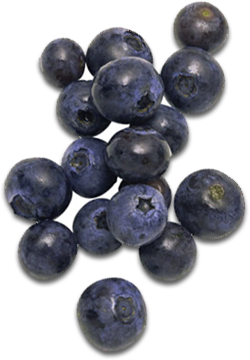no items to display
Summer Fruit Feature: Blueberries
Fruit lovers unite! July is National Blueberry Month, and there’s good reason to celebrate. If you haven’t heard the buzz about blueberries, you’ll want to read this post—the humble blueberry can not only nourish your body, but protect your brain health! Check out some of the recent findings from animal research showing how blueberries support cognitive function:
- Toxin Protection: Rats fed a diet containing blueberry extracts for eight weeks before being exposed to radiation were protected against reductions in brain function.[1] Similarly, blueberry-eating rats administered a toxic substance were protected against brain cell loss and performed better in a maze test than rats eating a regular diet.[2]
- Alzheimer’s Disease Prevention: Mice that were specifically bred to develop Alzheimer’s disease, but who were fed a blueberry-supplemented diet from four months of age on, retained complete memory function at 12 months (mouse middle age)—as well as mice without the genetic defect! The researchers concluded, “Thus, our data indicates for the first time that it may be possible to overcome genetic predispositions to Alzheimer’s disease through diet.”[3] Wow.
- Memory Decline Reversal: The same group of researchers wanted to see if adding blueberries to the diets of older mice for a short period of time could reverse age-related declines in memory—not just prevent it. After just one month of eating a blueberry-enhanced diet, 20-month-old “senior” rats had significantly better memory scores than they did just one month earlier, while rats eating regular chow showed a slight decline.[4]
It’s not just animals who benefit from these little blue wonders, though. In 2010, a study showed for the first time that blueberries support brain heath in humans too. After 12 weeks of consuming a daily drink of blueberry juice, older adults who were at increased risk for dementia and Alzheimer’s disease experienced improvements in learning and memory.[5] Another study published in 2012 found that a high blueberry intake may delay cognitive aging in elderly women by 2.5 years.[6] Did I say “wow” yet?
Why are blueberries so good for brain health? Several reasons. First, they contain a high concentration of antioxidants— particularly anthocyanins—so they fight oxidative stress. Researchers have found a link between high levels of oxidative stress and declines in cognitive function. In other words, free radicals destroy your brain cells, and anthocyanins destroy free radicals.
Even more interesting, though, is that blueberry antioxidants (such as anthocyanins) are natural brain cleaners. While we sleep, our brains get to work cleaning up biochemical debris that can damage brain cells. Apparently this house cleaning process slows down with age, and blueberries ramp it back up.[7]
Are you inspired to eat more blueberries yet? Here are some quick and easy ways to incorporate them into your diet. (By the way, anthocyanins are not destroyed by drying or freezing, so you can eat your blueberries fresh, frozen, or dried and still receive their brain-boosting benefits.)
- Add ½ cup of fresh blueberries to your morning yogurt or cereal.
- Blend 1 cup of frozen blueberries and ½ banana with 1 cup of cow’s milk, almond milk or soy milk for a tasty smoothie snack. (You can even add your Juice Plus+ Complete shake mix for a nutritional boost!)
- Instead of the usual carrots and tomatoes, top your salad greens with fresh or dried blueberries and goat cheese for a fun twist.
What’s your favorite way to enjoy blueberries?
References:
[1] Daniels, Stephen. Berry extracts could offer stellar brain protection. NutraIngredients.com. July 13, 2006. http://www.nutraingredients.com/Research/Berry-extracts-could-offer-stellar-brain-protection
[2] Daniells, Stephen. Blueberries may reduce Alzheimer’s risk. NutraIngredients.com. June 27, 2007. http://www.nutraingredients.com/Research/Blueberries-may-reduce-Alzheimer-risk
[3] Joseph JA, et al. Blueberry supplementation enhances signaling and prevents behavioral deficits in an Alzheimer disease model. Nutr Neurosci. 2003 Jun;6(3):153-62. http://www.ncbi.nlm.nih.gov/pubmed/12793519?dopt=Abstract
[4] Malin DH, et al. Short-term blueberry-enriched diet prevents and reverses object recognition memory loss in aging rats. Nutrition. 2011 Mar;27(3):338-42. http://www.ncbi.nlm.nih.gov/pubmed/21168307
[5] Daniells, Stephen. Blueberries may boost memory in older adults: Study. NutraIngredients.com. Jan. 11, 2010. http://www.nutraingredients.com/Research/Blueberries-may-boost-memory-in-older-adults-Study
[6] Gray, Nathan. Flavonoid-rich berries could halt memory declines: Study. NutraIngredients.com. April 20, 2012. http://www.nutraingredients.com/Research/Flavonoid-rich-berries-could-halt-memory-declines-Study
[7] American Chemical Society. Eating berries may activate the brain’s natural housekeeper for healthy aging. Aug. 23, 2010. American Chemical Society. http://www.acs.org/content/acs/en/pressroom/newsreleases/2010/august/eating-berries-may-activate-the-brains-natural-housekeeper-for-healthy-aging.html






